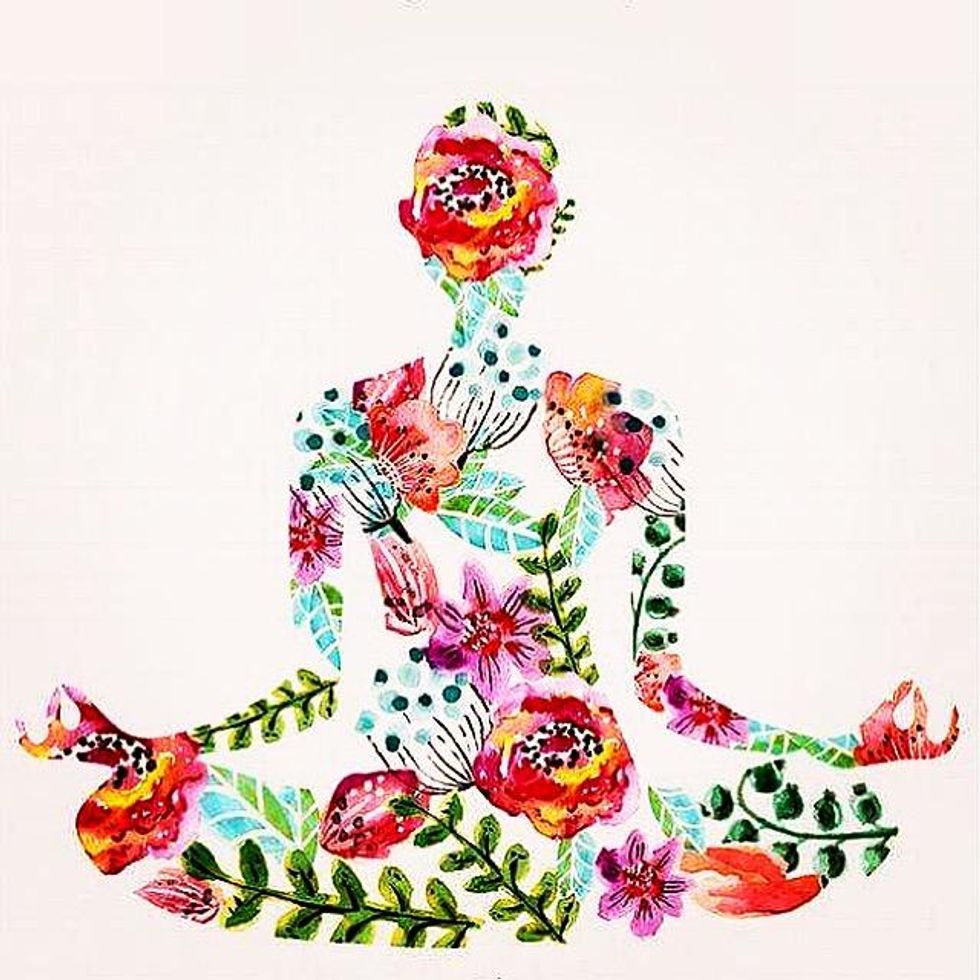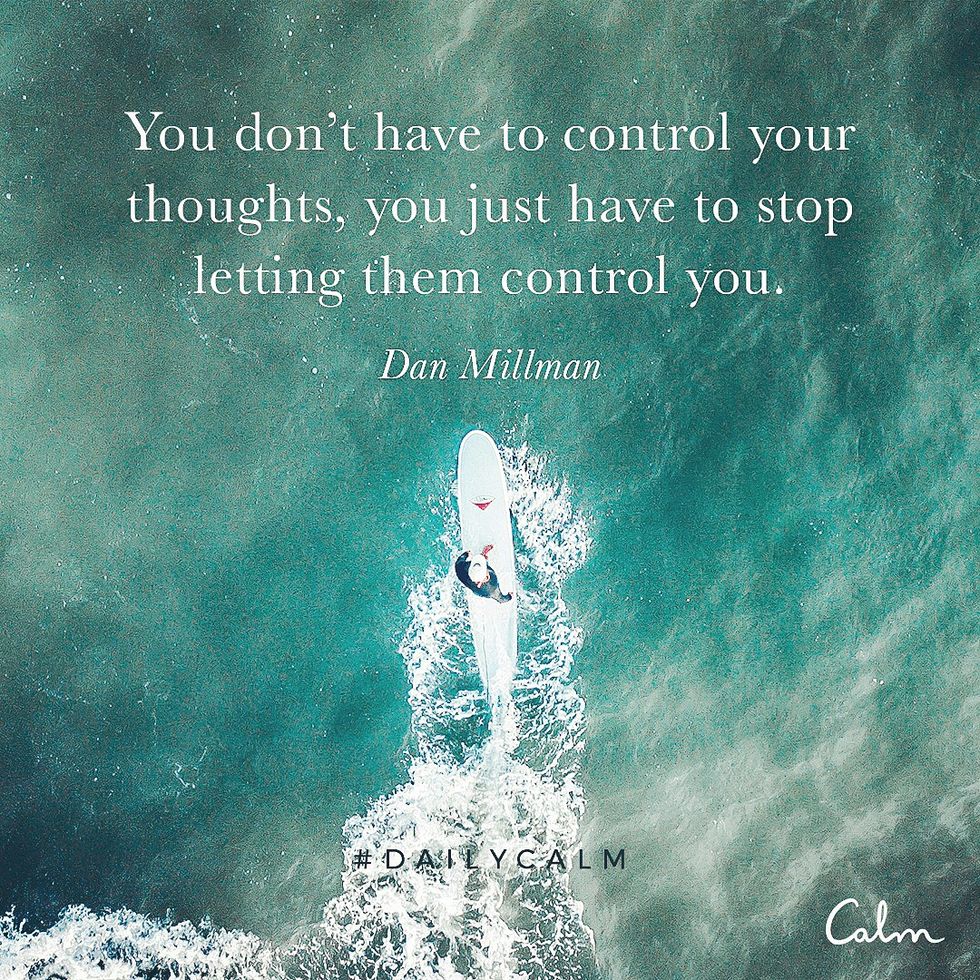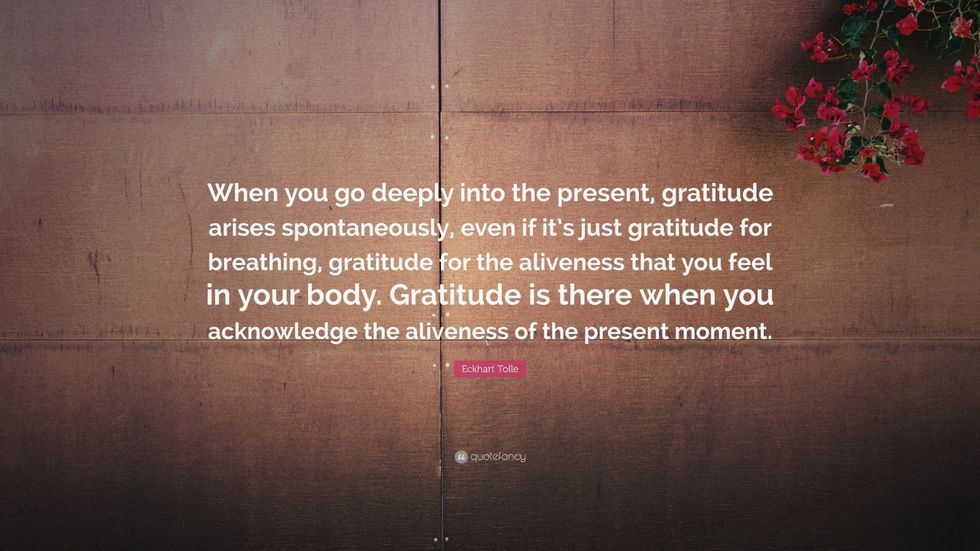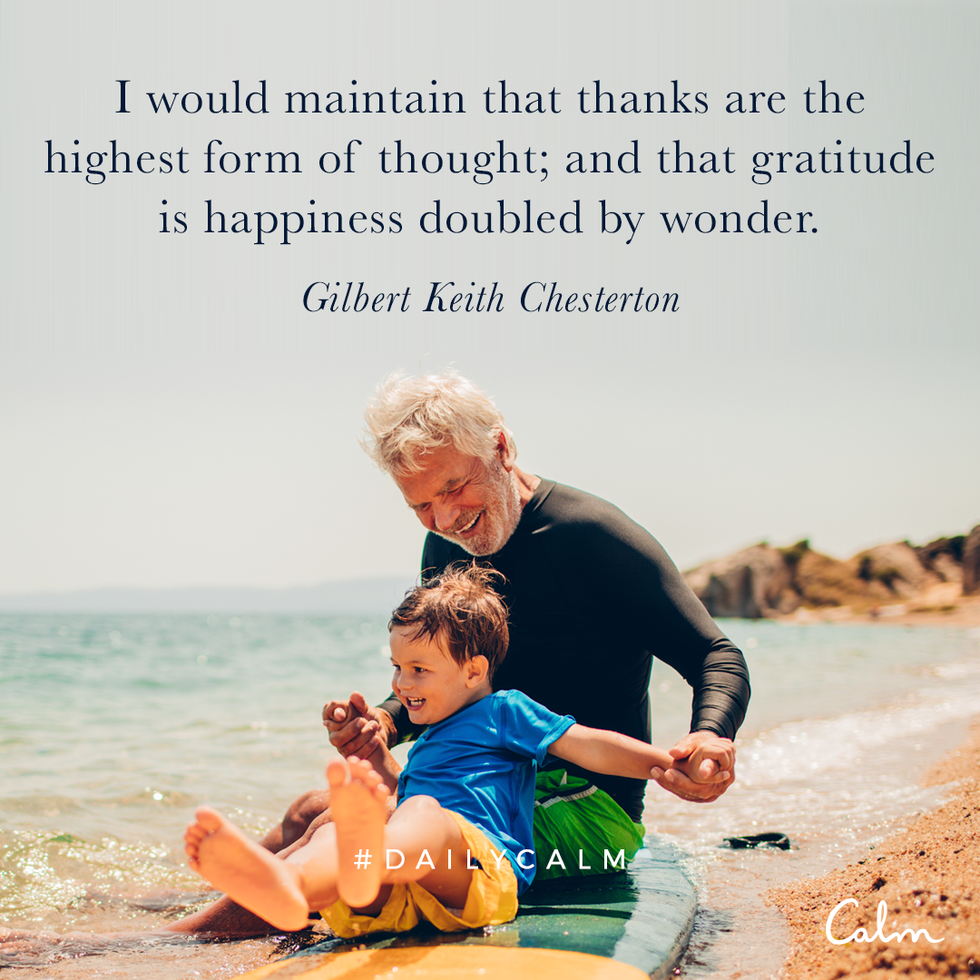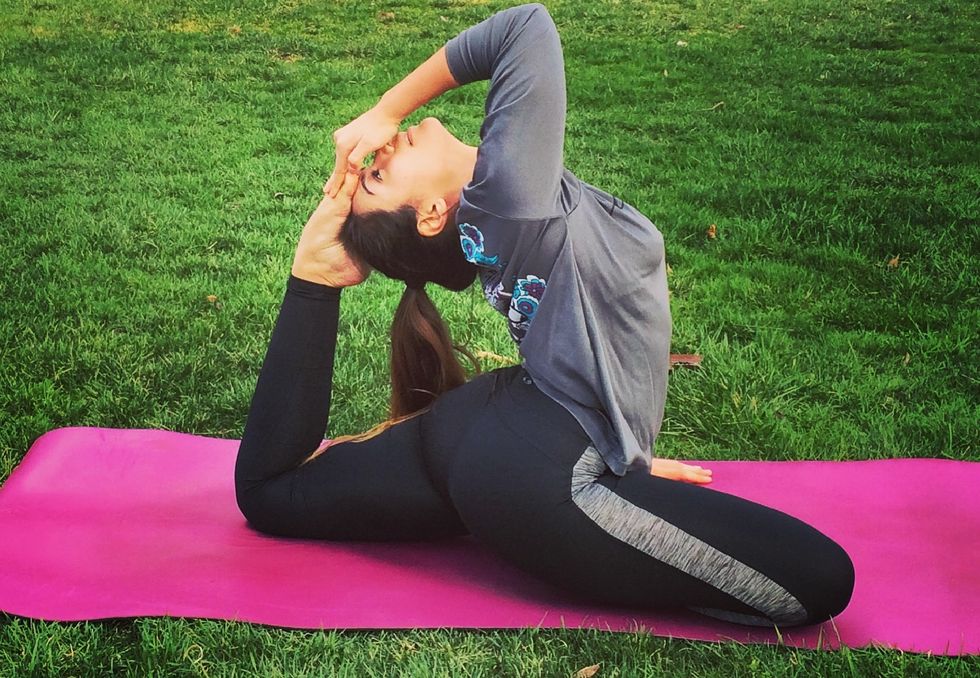Last week, in the first article of my series, I talked about how my gratitude practice has helped me cultivate positivity and resilience. This week I'll focus on how gratitude and mindfulness keep me grounded.
I struggle with anxiety and depression. I've always been high-achieving and highly functional, so I didn't fully come to terms with this fact about myself until last year. Looking back now, it's almost funny to me that I couldn't put the pieces together: crying spells, chronic pain and tension, difficulty sleeping, digestive problems, exhaustion, obsessive thoughts and worries-- I was a textbook case! And I work in the Health Education office; I knew the symptoms! I'm not interested in "I should've known," or in shaming myself for not taking steps sooner. But this illustrates just how out of touch with my own body I was, and how not being in touch with your body can blind you to otherwise obvious things about yourself and the world around you.
My gratitude practice helped me reconnect with myself physically, mentally, emotionally, and spiritually. And this in turn has led me back to all the things to be grateful for in myself and in my life-- a virtuous cycle! This week I'll tell you about how this change took place, and about how meditation, yoga, and eating well go hand-in-hand with my gratitude practice by reinforcing the skill of mindfulness.
Why I Love My Gratitude Practice:
1. (from Week 1) It helps me maintain a positive attitude in the face of disappointment, frustration, and pain. Not every day is a good day, but there are good things in every day!
2. It reminds me to be mindful and live in the present, instead of worrying about the past or future.
My gratitude practice is a relatively recent addition to my self-care
regimen-- it actually arose from my daily meditation practice. For my
whole life before November 2017, I found meditation very inaccessible; I
always felt like I wasn't "doing it right." That's super common-- and it makes sense
considering the way most of us are trained to think in school: we work toward a specific goal, get prompt feedback about what we're doing right and what we're doing wrong,
and change what we're doing to align better with the goal. Most beginners have expectations about meditation; they think the goal is to feel good, to feel relaxed or to be able to completely clear their mind of all distractions. So if they don't feel that way (most people don't) they think they've missed the goal. But that's just the thing! Meditation is about mindfulness, which means being aware of yourself and your surroundings, not judging them or changing them to achieve anything in particular--the only goal is to exist in the present.
That's why it's so effective at combating the thought processes that fuel anxiety and
depression. Before developing a meditation practice, I was always stuck in the past, thinking about what I had or hadn't done, whether it was right or wrong, what I could've done differently-- or I was obsessed with the future, stressed about the deadline coming up, over-preparing for the worst case scenario, wishing for what I felt was missing in my life, or dwelling on what I was afraid of losing. Working on mindfulness, to me, is about focusing on what it feels like to be me right now, in my body, in the space I'm inhabiting. I strive only to pay attention: to observe whether my back hurts, whether I'm feeling anxious or happy, whether I'm craving sunshine or physical movement. Instead of clinging to the "positive" feelings I notice or immediately trying to correct what I perceive as "negative" feelings, I just watch them all and wait to see if they change or soften or intensify on their own.
This is usually way easier said than done! Please don't get me wrong-- four months of meditation has not made me a forever-zen robot who just lets go of everything and maintains a perfect, serene perspective all the time. I've certainly strengthened my patience and familiarized myself with strategies to get and stay in touch with myself over time, but I've also realized that the point isn't necessarily getting "better" at it. It's more about the ability to notice where I am that particular day and know that whatever state I'm experiencing will come and go, as all things do.
I'm not going to say that you have to be meditating daily to live mindfully or to get the most out of your gratitude practice-- you don't. But I will say that it was meditation that made me realize that I needed to create an intentional gratitude practice in the first place, and that it keeps me in touch with myself enough to notice the changes my gratitude practice is bringing about. Think about it: if you pay close, daily attention to your own body, thoughts, feelings, and surroundings, without judgement, without a belief that any of them are permanent, it follows that you'll notice all the big and little temporary things you appreciate! Some days it's My back doesn't hurt today-- wow, I'm so glad I did yoga this morning! Thank you, self, for that! And others, it's I'm feeling very sad because my visit with my mom is over and she's headed home-- how lucky am I to have someone like her to miss? I'm so grateful for her love and support. It was the amazing volume of thoughts and feelings like this during meditation-- and just more frequently in random moments as I began to incorporate mindfulness into my day-to-day activities-- that gave me the urge to start writing my "gratitudes" down. Now, I'm better able to clear my mind and focus during my meditation practice, because I know I have my gratitude practice as an outlet, later, to process this beautiful flood of appreciation-- like I said, virtuous cycle!
Tips for Creating Your Own Gratitude Practice:
1. (from Week 1) Write it down!
2. Show gratitude for your body: get in touch with it and care for it above all else.
So, if you hadn't already guessed, my first suggestion is to just give meditation a solid chance! I had tried to meditate in groups at the end of yoga classes or during self-care events in the past, but hadn't really gotten it to "click." What really worked for me was using the Calm App. It's great for those dabbling for the first time in meditation; it starts you off with a "7 Days of Calm" challenge that teaches you some of the basic strategies and conceptual pillars of mindfulness and meditation in easy 10-15 minutes daily sessions. After that is the "21 Days of Calm," which takes you a level deeper in-- and by the end of that, you've been meditating daily for 30 days! That's a solid habit, a self-care practice that you can be proud of! I like that it keeps track of your progress to you stay motivated and consistent (for example, I'm currently on a 19 day streak, my longest streak is 20 days, I've completed 136 individual meditation sessions since signing up, and my total time spent meditating adds up to 1 day, 7 hours, and 38 minutes). And at the end of each session, when you're using the mobile app, a lovely image with a thought-provoking quote pops up. I save a lot of them-- and I've included a couple in this article. Calm also has sessions dedicated to helping you fall asleep, podcast-like master classes about different mindfulness topics you can listen to, music, a blog, and more. After a certain point, I know there is a cost to continue with the app. If that's a restriction for you, I know there are a ton of other meditation apps, YouTube videos, etc. you can use. All I'll say about that is that I paid the yearly fee for Calm without thinking twice and it's easily been worth it for me. The point isn't really how you meditate-- it's just making a consistent and sincere effort to be with yourself, focused on the present, without judgement. Try it out for the next 7 days and see if you notice any change over that time!
My second tip is to treat your body to a form of exercise you enjoy! Anyone who is truly in touch with their body knows that exercising regularly just makes everything better-- you experience less pain, you sleep better, you're less stressed, you crave healthier foods, you're more hydrated, etc. I love yoga because it's a form of exercise that aligns nicely with mindfulness and meeting your body where it is that day, rather than pushing yourself to hit a certain amount of weight, reach a certain distance, achieve a specific aesthetic, or complete a particular number of reps. I've lived with chronic pain for a long as I can remember, but the stretching and alignment focus of yoga allows me to access my body's full potential safely. All that being said, what matters here is getting in touch with yourself, and rewarding your body with the type of exercise it enjoys. Your body is amazing! Working out need not be about suffering to earn food or pride in your appearance-- and it shouldn't be a punishment either. For those of you who took my challenge and practiced gratitude by writing things down last week, take a moment to think about how many of those things would be accessible to you to enjoy if it weren't for your body. Very few indeed! As you get in touch with your body through mindfulness, make sure to express your gratitude for your incredible, resilient, capable body by giving it the movement it loves: Zumba, weight lifting, walking the dog around the block, morning stretches, bike rides to the park with your best friend, running around the block, booty dancing in front of your bedroom mirror-- it all counts! And, if you're exercising mindfully, you'll probably notice that most bodies really appreciate variety, so try something new every once in a while. Treat your body as if you appreciate it, and it will only give you more and more to be grateful for.
Finally, eat yummy food that makes you feel good! I've been vegetarian for almost four years now, for plenty of reasons, but the main reason I've stuck with it for so long and plan to continue is because of how much better I realized I felt on a daily basis. I know people who've tried it and do not get that same benefit out of vegetarianism, or any other specific diet, and to them I say-- don't do it! Eating should be a pleasure, not just in the moment the food is in your mouth, but in the whole experience of eating. Because eating and digestion and *ahem* excretion are just that-- one whole experience we are meant to be in touch with and enjoy at every stage. Now, don't get me wrong, your girl loves a donut every once in a while; just last week I bought a whole box of Gushers. This isn't about eating only certain kinds of foods in certain amounts-- it's about paying attention to your body before, during, and after eating and noticing how the foods you eat make you feel. I eat a ton of veggies, because I think they're freaking delicious, and because I notice that I always feel strong, energized, and satisfied afterwards, without feeling too full or having that gross feeling hours after eating greasy or heavy meals. I am so grateful to my body for all it does for me, so I feed it like I love it-- I give it what I know it needs consistently, but I also spoil it with little treats sometimes. It is unreasonable to expect your body to continue to perform in the way it must to accommodate a full life if you don't prepare it and reward it for that by feeding it well. Pay attention this week to your whole eating experience each day (maybe write some thoughts and observations down at the end of each day). Do you crash every time you have coffee later than 4 pm? Do you feel bloated when you eat cheese? Did you feel really energized and focused when you drank a whole bottle of water before class? Listen to what your body is telling you and incorporate what you learn into your gratitude practice!
That's all, folks! This was a longer one; please let me know your thoughts. I want to hear about your experiences with any budding gratitude practices, feedback about the way I'm writing these articles, questions about any of the ideas I talk about-- any and all comments are welcome and appreciated! I'll leave you, again, with a quote:
"We are given senses to receive our information with. With our own eyes we see, and with our skin we feel. With our intelligence, it is intended that we understand. But each person must puzzle it out for himself or herself [or hirself or themselves -- holla at my non-binary loves]." -- Sophy Burnham


